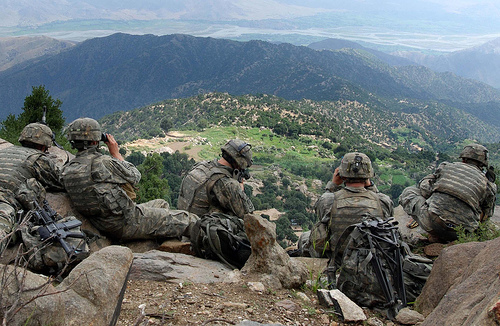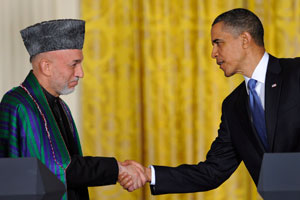
Flickr/ <a href="http://www.flickr.com/photos/soldiersmediacenter/1330419260/">US Army</a>
It’s amazing that newsworthy information can hang around in the public sphere, sometimes for years, before the media stumble on it and act like they just discovered electricity. This weekend, reporters went nuts over Harvard researcher Matt Waldman’s report (PDF) that the Taliban is being supported by Pakistani intelligence. “The relationship, in fact, goes far beyond contact and coexistence, with some assistance provided by elements within, or linked to, Pakistan’s intelligence service (ISI) or military,” Waldman writes.
Sounds sexy. But why is this exciting editors and reporters now, though? It’s not a new story—it’s been pretty well reported since before 9/11. The only novel revelation in Waldman’s study—if true—is that Pakistan’s president met personally with Taliban prisoners to express his support and that the nation’s military intelligence agency, Inter-Services Intelligence (ISI), actually has a seat on the Taliban’s governing council in the border city of Quetta. But it is a report that raises a lot of questions for the US about its continued involvement in the war for Afghanistan.
Waldman’s study could be a lot of Taliban hot air. Beyond his own interviews with Talib commanders, he cites as evidence The New Yorker‘s Steve Coll and Pakistan-based jihadi expert Ahmed Rashid—no slouches, to be sure, but still not the fullest picture one might hope to get. Some regional experts are beating up Waldman pretty badly over this “onesided” report, and he doesn’t come off brilliantly when met with skepticism by this TV interviewer. Yet much of what he says is pretty widely accepted in academic, military, and diplomatic circles. Just in the past year, major media have reported that the ISI assists jihadis in selecting bombing targets and even helped Mullah Omar Muhammad (remember him?) flee US drone attacks to set up camp in the madrassas of Pakistan’s urbane Karachi.
Why would Pakistani military intelligence—largely well-bred, Western-educated, professional elites—cast their lot with South Asia’s knuckleheaded takfiris? The commonest answer is external balancing: The idea that Pakistan has an interest in not seeing too strong an Afghan state emerge to challenge Pak influence. There’s also the internal balancing argument: The Taliban’s very popular with a large swath of Pakistanis, and America isn’t.
But most of all, the ISI wants to control the Taliban. It’s a fertile source for proselytizers and warriors in Pakistan’s ongoing Kashmir dispute with India. And clandestine agencies often buy into the idea that cooperation with a group gives you maximum knowledge and control over the group’s activities. As one Pakistani officer told the New York Times, “In intelligence, you have to be in contact with your enemy or you are running blind.”
Beyond the whys, though, the important question is: If there’s a solid Pakistan-Taliban link, what should can the US do about it? Waldman concludes: “The powerful role of the ISI, and parts of the Pakistani military, suggests that progress against the Afghan insurgency, or towards political engagement, requires their support.”
That’s not good news for Americans. Our ability to cooperate and coordinate with the ISI has never been great—the relationship was probably best during the Soviet incursion into Afghanistan, when it consisted of us giving money to the ISI to give to the right jihadis in Afghanistan (many of whom would later form the backbone of the Taliban). And any strongarm diplomatic effort is likely only to weaken US-Pakistan relations, as well as drive a bigger wedge between Pakistan’s civilian and military officials.
Which doesn’t leave many US options. For his part, Waldman advocates an indirect appriach to pacifying the ISI and, by extension, the Taliban: “The only sure way to secure such cooperation is to address the fundamental causes of Pakistan’s insecurity, especially its latent and enduring conflict with India.”
Great! Yes, let’s address India-Pakistan. While we’re at it, let’s find bin Laden, solve Israel-Palestine, quell nuclear ambitions in Tehran and Pyongyang, and salvage the world’s biggest economy, too!















